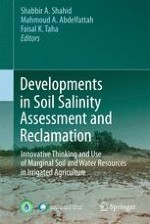2013 | OriginalPaper | Buchkapitel
50. Sustainable Agriculture Through Integrated Soil Fertility Management on Degraded Lands
verfasst von : Muhammad Aamer Maqsood, Shahid Hussain, Tariq Aziz, Muhammad Ashraf
Erschienen in: Developments in Soil Salinity Assessment and Reclamation
Verlag: Springer Netherlands
Aktivieren Sie unsere intelligente Suche, um passende Fachinhalte oder Patente zu finden.
Wählen Sie Textabschnitte aus um mit Künstlicher Intelligenz passenden Patente zu finden. powered by
Markieren Sie Textabschnitte, um KI-gestützt weitere passende Inhalte zu finden. powered by
